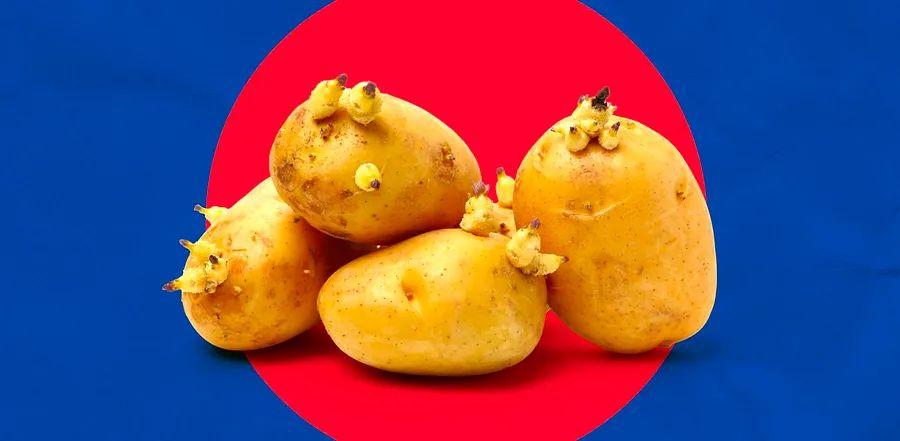A Potato Expert Explains: The Ultimate Method to Keep Your Potatoes From Sprouting

Whether you're enjoying them fried, roasted, baked, or turned into crispy tots, potatoes are a staple in many kitchens. According to the USDA, the average American consumes about 50 pounds of potatoes annually. Not only are they delicious, but potatoes are also a nutritious source of protein and fiber. Plus, they’re budget-friendly—often a 5-pound bag costs just a few dollars.
But for smaller households, finishing off all those potatoes before they spoil can be tricky. That’s why the viral tip of adding an apple to your potato bag to prevent sprouting has gained attention online. But does it really work? We consulted the experts, examined the science, and tested it ourselves to find out.
Tips for Keeping Your Potatoes From Sprouting
Storing potatoes in the wrong conditions—like a warm or bright space—will cause them to sprout quickly, says Sastry Jayanty, Ph.D., a postharvest physiologist at Colorado State University’s Potato Program. If your potatoes have sprouted, you can still eat them as long as you remove the sprout completely. However, avoid eating potatoes that have turned green, as they may be harmful.
Besides storing your potatoes in a cool, dark, and well-ventilated spot, does adding an apple to the bag actually help prevent or slow down potato spoilage? The answer is a bit more nuanced.
There is some scientific backing for this idea. Apples, along with other fruits like bananas and tomatoes, release ethylene gas, a natural plant hormone. This gas is crucial in the ripening of fruits and aging of vegetables. The idea behind placing an apple with potatoes is that ethylene gas may help inhibit potato sprouting, a theory that has shown promise in at least one controlled lab test.
The research, published in the Journal of Food Science and Technology, explored the impact of ethylene on potatoes. Scientists treated Favorita (yellow) potatoes, stored in cold conditions, with measured doses of ethylene gas at set intervals. They studied the potatoes' sprouting, respiration rate, sugar and starch levels, and the activity of enzymes involved in sugar metabolism after exposure to ethylene.
The results indicated that ethylene treatment successfully delayed potato sprouting, at least in these controlled conditions.
Since the ban on the sprout-preventing chemical chlorpropham (CIPC) in Europe in 2020, many potato growers have been seeking alternatives to maintain freshness. Jayanty explains that large producers are particularly interested in using ethylene, as the research looks promising. However, despite significant resources, perfecting the process has proven challenging.
If big companies with access to lab-grade ethylene and expert scientists can't make it work, can everyday home cooks succeed with just an apple?
Does an Apple Actually Prevent Potatoes from Sprouting?
To test the apple-and-potato theory, I set up a simple experiment in my kitchen. I divided a bag of potatoes into two groups: one with an apple and one without. Both bags were stored in a cool, dark pantry, and I checked them daily for over a week.
Surprisingly, after seven days, the bag with the apple sprouted first, while the bag without the apple didn’t sprout until a full 24 hours later, on day eight. This was an unexpected result, especially given the research. However, it's crucial to note that the success of ethylene gas in delaying sprouting depends on factors like the gas concentration, potato variety, and storage conditions, says Jayanty.
My kitchen isn't a controlled lab, and the climate wasn't precisely managed. Also, different potato types might respond differently to ethylene exposure. Most supermarket potatoes are treated to resist sprouting, but the potatoes I used were likely untreated, as they came from a farmers market. Plus, it's unclear how much ethylene gas my apple was releasing in the first place.
"I once judged a science fair project where a middle schooler tested this idea. He wanted to figure out which fruit—apples or bananas—was better at preventing potatoes from sprouting," says Jayanty. The student found that bananas were more effective, likely because they release more ethylene. So, while the apple hack might work, it's not guaranteed—results can vary.
The Bottom Line: The Best Way to Keep Potatoes from Sprouting
There's no harm in trying the apple (or banana) method at home, says Jayanty. It won’t hurt your potatoes, and it might slow down sprouting a little. But don’t rely on it entirely. The best way to keep your potatoes fresh is to store them properly, following these expert guidelines:
- Keep them cool and dark: A temperature range of 45-50°F is ideal. Avoid direct sunlight and as much temperature fluctuation as possible.
- Give them some air: Potatoes need good ventilation to prevent moisture buildup, which can lead to rot. Store them in a breathable container like a paper or burlap sack, a mesh bag, or a wooden crate.
- Keep them separated: Don’t keep potatoes with onions. Onions are the anti-apples: they release gases that can cause potatoes to spoil more quickly.
- Avoid refrigeration: While it may seem logical to store potatoes in the refrigerator, it's not recommended. The cold temperature can convert the potato starches into sugars, affecting their taste and texture. Instead, keep them in a cool pantry or cellar.
- Watch for rot: One bad potato can spoil the bunch. Remove any bad potatoes to prevent them from affecting the others.
Want to keep your potatoes from going bad? The best solution is simple—eat them in your favorite dishes before they spoil.

1

2

3

4

5
Evaluation :
5/5